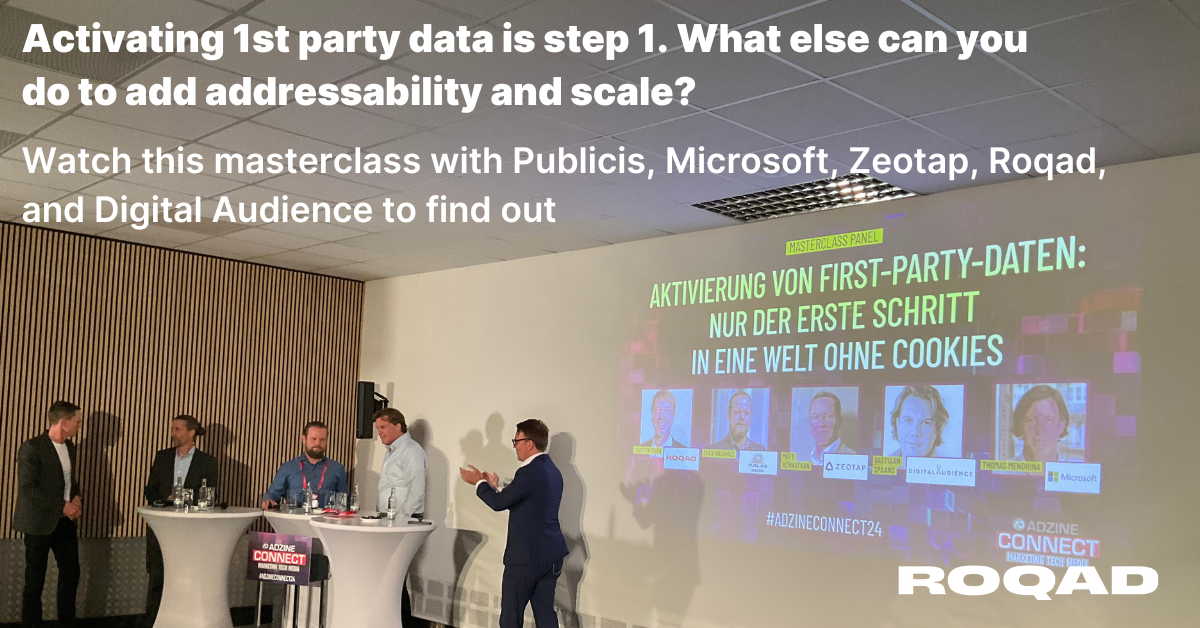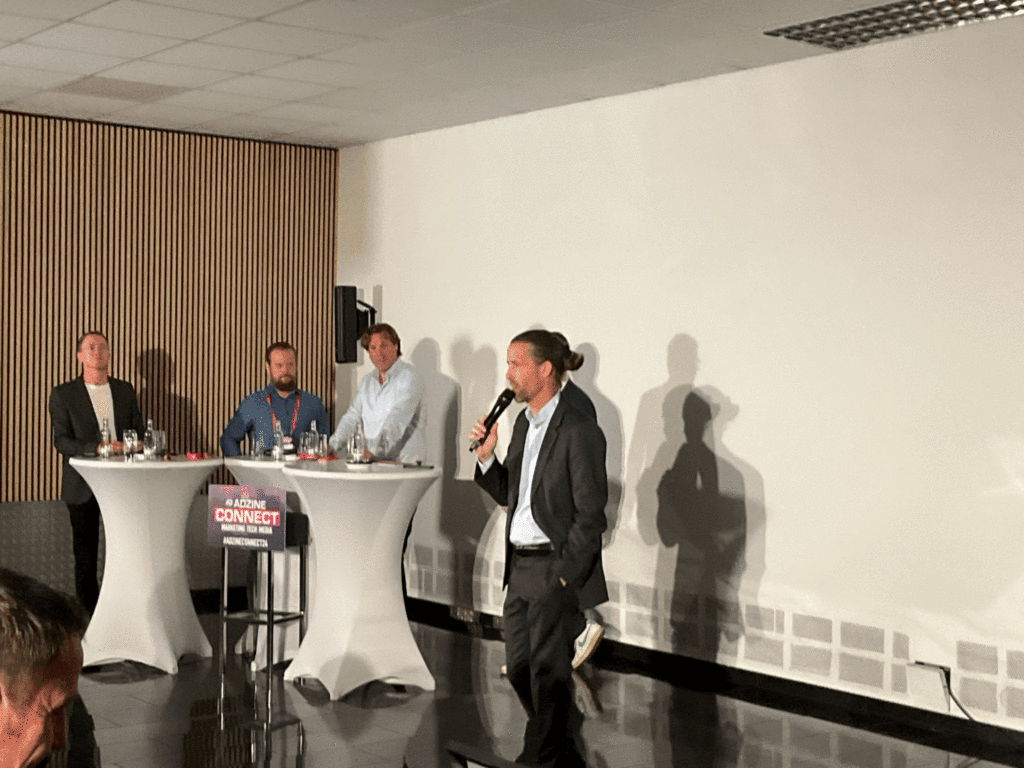

We have a 1M things going on but when Georgina A. Yeboah and Adzine reached out with the idea of a masterclass on first party data activation, we knew we had to make it happen. We had a talk about it and added a “what else can you do with 1st party data activation? It’s just the first step! There are a number of tools available. That’s why we called the class “Aktivierung von First-Party-Daten – nur der erste Schritt in Eine Welt ohne Cookies” or Activating First Party Data Is Just the First Step in a World Without Cookies.”
We invited some smart friends who represent different perspectives on the problem and can discuss different toolsets, adtech veterans all: Thomas Mendrina from Microsoft; Matt Bennathan the CCO from Zeotap, Sven Wegholz from Publicis Media, Bastiaan Spaans from Digital Audience
What we expected to happen happened: our friends brought energy and insights to the masterclass. I’ll attach some of my favorite photos and we’ll post the video soon. I think you’ll find it helpful.
I had some interesting conversations at the conference that has influenced my thinking on industry trends. I’ll share some of those thoughts soon as well.
Thanks to ADZINE – MARKETING. TECH. MEDIA., René Weber, Sika Prempeh for taking beautiful pics and of course, once again, to our rocking speakers!
Sven Wegholz / Publicis Media / transcript
Yes. Many thanks, Carsten, for the quick intro. I’ll jump in directly. I’m Sven Wegholz from Publicis Media, and I want to describe what all this means for us as an agency and for our customers.
What’s the challenge?
I want to link back to the previous panel, and back to this question:
When will 3rd party cookies be switched off?
And I’d like to plead in favour of this:
It totally does not matter.
It should not matter at all when Google will finally turn off 3rd party cookies.
So, with all respect for Google, Google is an important partner to us.
But as an industry we should not focus too much on Google and keep staring at them, wondering when they will finally turn off 3rd party cookies.
Because, it’s the new running gag.
And it’s been 10 years since we said: Now, the mobile year is coming.
This also took much longer. And it will take some more time for Google – if it happens at all.
And I want to show you why that’s the case.
Some of you may have seen this already on other charts.
We’ve previously seen the sinking Titanic and now I’m providing the corresponding iceberg.
Because, it’s important to understand:
We often just see what’s on the surface of the water.
When we look at the browser share, and yes, Google is important in Germany with 45-50% browser share of the German internet.
But let’s take a look under the surface of the water.
Here, we see pretty quickly: Users do have privacy settings in Chrome browsers, they
surf in privacy modes or delete cookies on a regular basis.
So, if I do an optimistic calculation I’ll get about 30% of addressable 3rd party cookies.
And this is fact today, not next year 2025 or whenever – it’s actually already there.
And this is the challenge we’re facing. And it is actually one of the biggest challenges that we have in digital marketing.
We have to face this.
That’s why my intro slide said: Embrace change. Accept the change.
Because the good news is this – there are alternatives. And we have heard that several times today.
I’ve amended it a bit to the marketing funnel formula AIDA.
You all know it.
Let’s start at the beginning: contextual audiences.
I can adress those very well. The good thing is they are GDPR compliant. I’ve a relativley wide reach, good scalability, it works and I can engage people.
The problem is, users are a bit anonymous.
If I go a bit deeper to Interest and Desire, I’ll land at platform data.
And platform data is all about Walled Gardens and publishers or websites and data partners which we have in the market and which we can use.
All that data is useful and I can meaningfully use it.
I can be more precise and take the next step in the sales marketing funnel which makes it more usable.
Finally, I’m coming to the clear users with unique IDs.
Take a look at the funnel, it’s narrowing towards the end. Unique IDs are more challenging
in regards to reach and scalability. But we have solutions here, too.
So, are ID solutions the gamechanger for people based marketing, for real people based marketing?
I think so, if as an industry we get it right.
Privacy is very important here. But we’re also facing a big challenge.
Carsten has already mentioned it. I want to repeat it again.
We have a highly fragmented market in regards to ID solutions, different technologies,
different partners, in different regions, different partners, different approaches on how to build IDs and so on. Many challenges here.
I heard numbers of about 400 ID solutions. And 40 IDs in Germany.
That’s madness of course.
It will consolidate, no question about it.
My expectation is, we’ll have 3 to 5 globally, maybe even 10 different ID solutions we need to work with.
And we need solutions for that.
One thing is pretty obvious: the market is not looking for a new ID solution.
Neither are we as an agency or advertisers.
They’re looking for solutions. They’re asking, how can I reach my audience? This is what matters to them.
I don’t need another ID solution.
And how we do that is pretty simple, very superficial, very roughly depicted and simplified.
Let’s have a look, on the left. I have input data, TV data, I have different publishers, panel data, retail media. Very important topic – retail data.
I have different partners. And certainly customers.
And I could write ID behind all of it because everything has got a kind of ID but everything has a different ID and I need to bring it together.
That means, I start matching that data and Roqad can help us with its multi ID graph.
And they can say this ID and that ID is the same user.
You don’t need to address both, we can use a capping. And on that basis we have the option to do analytics, to generate insights.
We can have a model for all of that for activation and finally use it for the measurement.
That’s what we have to face as an agency. And our mission as Publicis Media together with our partners is to make every ad impression relevant by really combining all data with each other.
My presentation could end now. But I just want to say, you remember, we’ve just seen the funnel. If I consider the end, where it’s getting smaller: unique users, unique IDs, 1st party data.
I can use that to build really good audiences on top of it, audience segments, by combining
the meaningful data and connect it with each other. And you can re-enter it at the top of the funnel and start from the beginning.
And you can reach your audiences.
So, what I would like you to take away, here, from this short presentation.
The challenge is real. It’s happening.
I say it again, it’s 30%.
If we calculate 3rd party cookie reach favourably.
Data partners are essential for us as an agency but also for advertisers.
In my point of view, 1st party data is a gamechanger.
I know, this is a challenge for some advertisers.
It’s a challenge to generate that data. But we certainly have solutions out there in the market for everybody.
Thomas Mendrina / Microsoft / transcript
So we heard a lot about IDs, we heard about what’s going to be added to the bidstream.
As a Publisher, you need to be able to decide whether to share an identifier directly with a platform, or it can be done indirectly via CDP. It needs to be matched, it needs to be activated.
That’s the difficulty in the times that we’re in at the moment. Especially in regions that are very privacy sensitive, the publishers are a little bit unsure what to do. But there are several ways.
So we see a lot about “activated via CDP” because then if you have registered data, you can activate and match it with the advertiser data, and this increases the ad spend. But what we also see is that some publishers have very persistent data. They only want to share and activate directly with an advertiser. That’s also possible. It is also possible in a way without adding it to the bidstream. So there are ways that are privacy safe where data can be activated. And I think the panel here shows a lot of the different solution that exists and for the publisher, it’s very important to understand there are several.
Make sure that you talk to your legal team beforehand. But also make sure that everything is privacy safe so that no national DPA looks into your bid data and then sees persistent data that should not be there. There are solutions, and there are solutions that work for all of the browsers.
So we’re happy to engage on that road and see what’s the advantage for both advertiser and publisher. Thanks so much.

Thomas Mendrina of Microsoft presenting at Adzine Connect